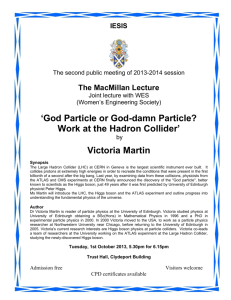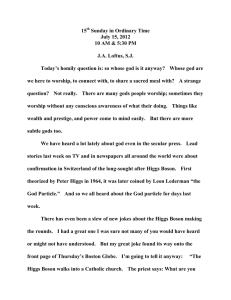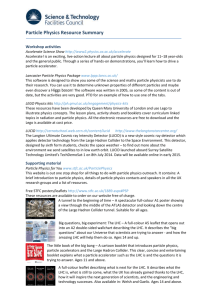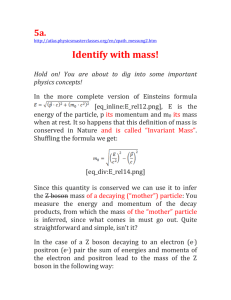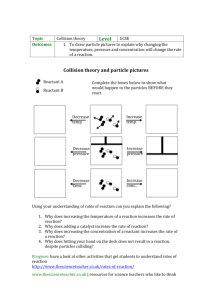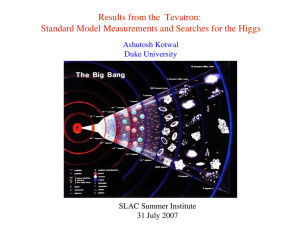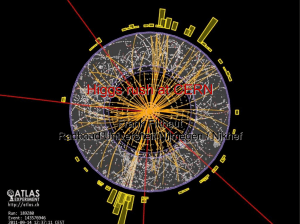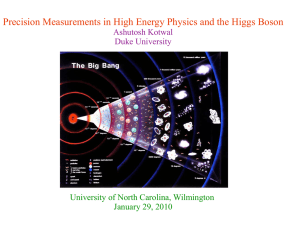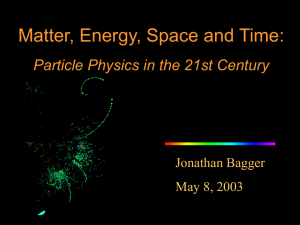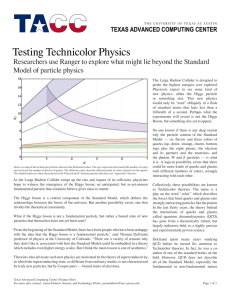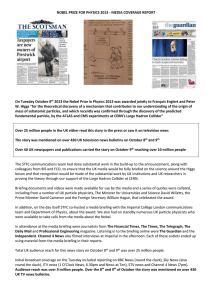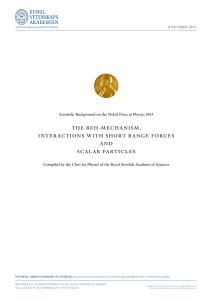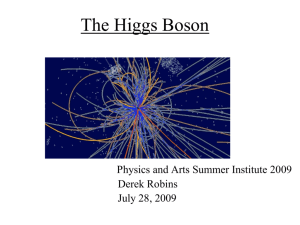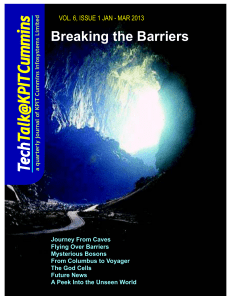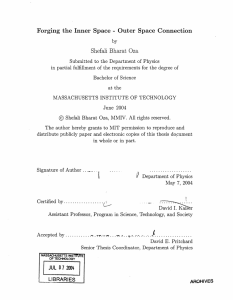The God particle, personalized medicine, and the tragedy of the
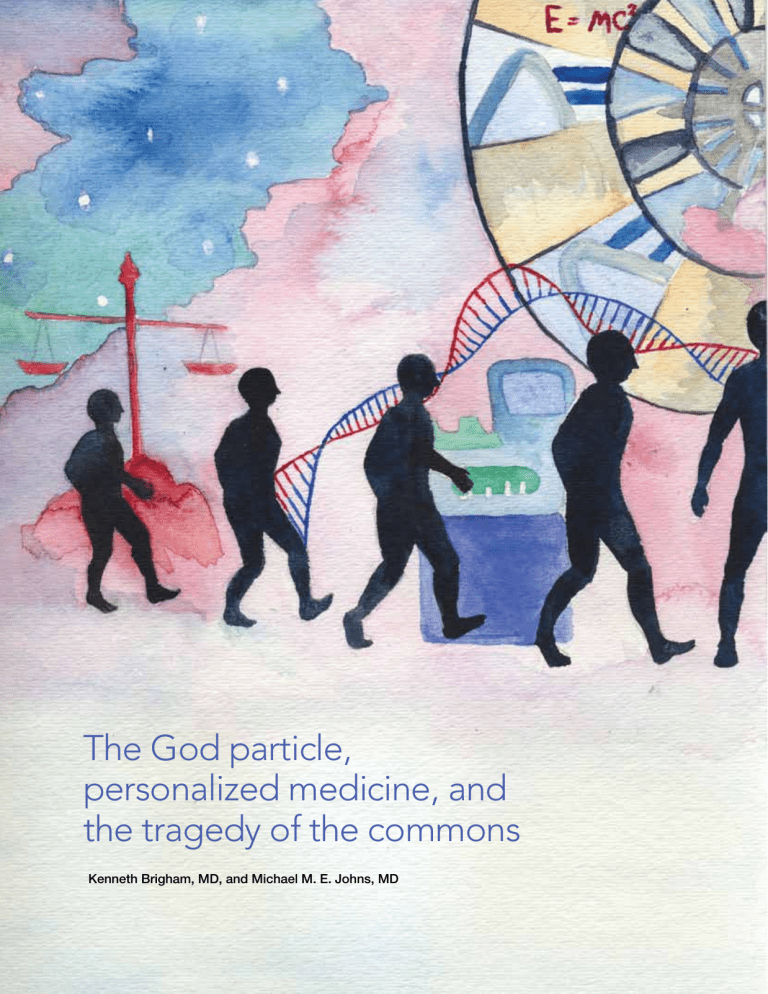
18
The God particle, personalized medicine, and the tragedy of the commons
Kenneth Brigham, MD, and Michael M. E. Johns, MD
The Pharos/Summer 2013
Dr. Brigham ( AΩA , Vanderbilt University, 1966) is Professor of Medicine, emeritus at Emory University School of Medicine and former Associate Vice President for Health Affairs and
Director of the Predictive Health Institute at Emory University.
Dr. Johns ( AΩA , University of Michigan, 1968) is former
Chancellor of Emory University and was previously Dean of
Johns Hopkins University School of Medicine. They are the authors of Predictive Health: How We Can Reinvent Medicine to Extend Our Best Years (Basic Books, 2012).
Illustration by Laura Aitken
The Pharos/Summer 2013
T echnology can do some very complex and difficult things. Although it has taken almost half a century to track down, the discovery of the boson that Peter
Higgs inferred as critical to understanding our world and its contents (so critical that it has been nicknamed the God particle) was announced last year on the fourth of July.
1 Dr.
Higgs and his colleagues probably didn’t anticipate in 1964 that discovering the physical evidence for their boson would have to await the dawn of a new millennium and would require construction of the Large Hadron Collider with a price
19
The God particle tag of well over four billion dollars, but, being scientists, they likely suspected that the technology for proving it would happen sooner or later. We have good reasons for putting a lot of faith in technology.
The recently much-touted concept of personalized medicine presents complexities as challenging as those of particle physics. Fully realized, the concept would require that each individual’s unique characteristics be measured and his or her health/disease care delivered as a one-of-a-kind “bespoke” experience. The technology that enabled sequencing of the human genome—at a cumulative cost almost as high as that of constructing the Large Hadron Collider—headed us in that direction. Before long it will be entirely feasible for anyone to have his or her complete genome sequenced. Recent reports of spectacular (if sometimes heart-rendingly temporary) effects of novel therapies based on the genomics of an individual cancer patient attract our attention and raise our hopes.
But human uniqueness is neither limited to nor completely defined by one’s genes. How those 20,000 genes are translated into over 100,000 proteins that then give rise to probably a million metabolites are also opportunities for individuality.
This means more technology—proteomics, metabolomics— and the development of information systems capable of making sense of all those data. How you conceive “personalized medicine” depends on how much of the technology you choose to use. How personal do you want it to be?
Mike Snyder and his colleagues at Stanford ventured beyond the concept of genomics-based personalized medicine to introduce the iPOP, an “integrative personal omics profile.” 2
Snyder and his forty-odd collaborators combined the whole range of analytical technologies to generate a model that not only describes one’s health status but predicts what’s in store.
They measured iPOPs repeatedly in a single person and concluded that models based on integration of omics data gathered over time in the same person can attune health care to the very individual peculiarities of biology that make each of us who we are and even who we are likely to become.
Another triumph of technology. Unfathomable (at least to the unaided human brain) complexity sorted out. Scaling this up, realizing the ideal of truly personalized medicine, will not be limited by the technology. Moore’s Law would predict that.
Can we trust our understanding of the universe and ourselves to the awesome powers of technology? Probably not.
Just four years after Higgs postulated his boson, the ecologist Garrett Hardin wrote about human problems with “no technical solution.” He puts these in the context of (apparently he coined the term) “The Tragedy of the Commons,” the fact that people motivated by their personal self-interest will deplete a shared finite resource. Hardin believes that technology cannot solve problems of “human values or ideas of morality.” 3
Seeing the God particle is not seeing God . And iPOPs cannot completely define humanness. Machines and technology can do marvelous things, but they do not make poets and philosophers obsolete. There is a reason such subjects are called “humanities.”
Understanding individual health and how to keep it (or what to do when it’s lost) is a problem that is partly solvable by technology, but not completely. Human values and ideas of morality are integral to health. They do not lend themselves to measurement by machines. They baffle the technological world. Just as our understanding of the universe and our place in it is not made complete by the discovery of the Higgs
Boson, the ideal of health care that sees its goal as an individual human experience that is more than a fact of biology will not be a product of omics done in isolation. If science is the warp of the fabric of a good life and death, its weft is humanity.
A physicist of an earlier generation, Albert Einstein, said,
“It has become appallingly obvious that our technology has exceeded our humanity.” Unless we pay close attention, increasingly sophisticated and powerful technology may lure us even further in that direction. If we let that happen we will have failed to grasp the full meaning of both our universe and ourselves.
References
1. Rincon P. Higgs boson-like particle discovery claimed at LHC.
BBC News Science and Environment 2012 Jul 4. http://www.bbc.
co.uk/news/world-18702455.
2. Chen R, Mias G, Li-Pook-Than J, et al. Personal omics profiling reveals dynamic molecular and medical phenotypes. Cell 2012;
148: 1293–1307.
3 . Hardin G. The tragedy of the commons. Science 1968; 162:
1243–48.
Address correspondence to:
Kenneth L. Brigham, MD
805 Peachtree Street, Apartment 612
Atlanta, Georgia 30308
E-mail: kbrigha@emory.edu
20 The Pharos/Summer 2013

